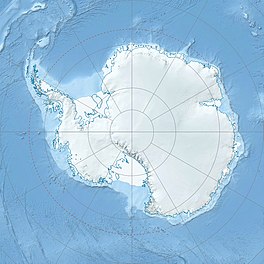Sallee Snowfield (82°37′S 50°20′W / 82.617°S 50.333°W) is a large snowfield between the Dufek Massif and northern Forrestal Range in the Pensacola Mountains, Antarctica.[1]
| Location | Queen Elizabeth Land |
|---|---|
| Coordinates | 82°37′S 50°20′W / 82.617°S 50.333°W |
Mapping and name
editThe Sallee Snowfield was mapped by United States Geological Survey (USGS) from surveys and United States Navy air photos, 1956–66. Named by Advisory Committee on Antarctic Names (US-ACAN) for Lieutenant Commander Ralph W. Sallee, Assistant Meteorological Officer on the staff of the Commander, United States Naval Support Force, Antarctica, in 1967 and 1968.[1]
Location
editThe Sallee Snowfield is between the Dufek Massif to the northwest and the Forrestal Range to the southeast. In the north it descends to the Ford Ice Piedmont. The Petite Rocks are in the east of the snowfield.[2] A glacier drains north from the snowfield past the Davis Valley in the northeastern Dufek Massif to the Ford Ice Piedmont. The Edge Glacier extends from the snowfield into the Davis Valley for about 4 kilometres (2.5 mi).[3] Rocks of the Dufek Intrusion are visible in the Dufuk Massif and the Forrestal Range, and are thought to be connected below the Sallee Snowfield.[4]
Nearby features
editFord Ice Piedmont
edit82°10′S 50°00′W / 82.167°S 50.000°W. The large ice piedmont lying northward of Dufek Massif and Forrestal Range between the lower ends of Foundation Ice Stream and Support Force Glacier. Named by US-ACAN after Arthur B. Ford of the USGS, Menlo Park, CA, geologist and co-leader (with Peter F. Bermel) of the USGS party in the Thiel Mountains, 1960-61 (leader 1961-62); field work at Lassiter Coast, 1970-71; leader of geological parties to the Pensacola Mountains in 1965-66, 1973-74, 1976-77, and 1978-79.[5]
Edge Glacier
edit82°29′S 51°07′W / 82.483°S 51.117°W. A small cliff-type glacier draining northward into Davis Valley. Mapped by USGS from surveys and United States Navy air photos, 1956-66. Named by US-ACAN for Joseph L. Edge, photographer with United States Navy Squadron VX-6 on Operation Deep Freeze 1963 and 1964.[6]
Petite Rocks
edit82°40′S 51°30′W / 82.667°S 51.500°W. Two small isolated rocks in the west part of Sallee Snowfield, about 5 nautical miles (9.3 km; 5.8 mi) east of central Dufek Massif. Mapped by USGS from surveys and United States Navy air photos, 1956-66. The name applied by US-ACAN is descriptive of their small size.[7]
References
edit- ^ a b Alberts 1995, p. 644.
- ^ Davis Valley USGS.
- ^ Management Plan ASPA 119, p. 106.
- ^ Ford 1976, p. D8.
- ^ Alberts 1995, p. 251.
- ^ Alberts 1995, p. 211.
- ^ Alberts 1995, p. 571.
Sources
edit- Alberts, Fred G., ed. (1995), Geographic Names of the Antarctic (PDF) (2 ed.), United States Board on Geographic Names, retrieved 2023-12-03 This article incorporates public domain material from websites or documents of the United States Board on Geographic Names.
- Davis Valley, USGS: United States Geological Survey, retrieved 2024-03-20
- Ford, Arthur B. (1976), Page 1 Stratigraphy of the Layered Gabbroic Dufek Intrusion, Antarctica (PDF), United States Geological Survey
- Management Plan for Antarctic Specially Protected Area (ASPA) No. 119 (PDF), ATCM, 2015, retrieved 2024-03-22
- This article incorporates public domain material from websites or documents of the United States Geological Survey.
